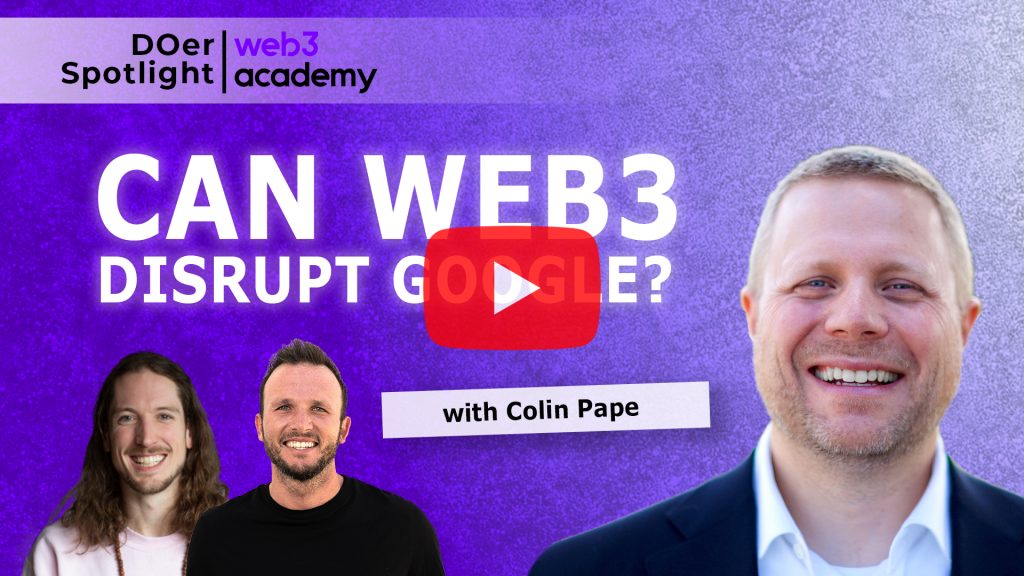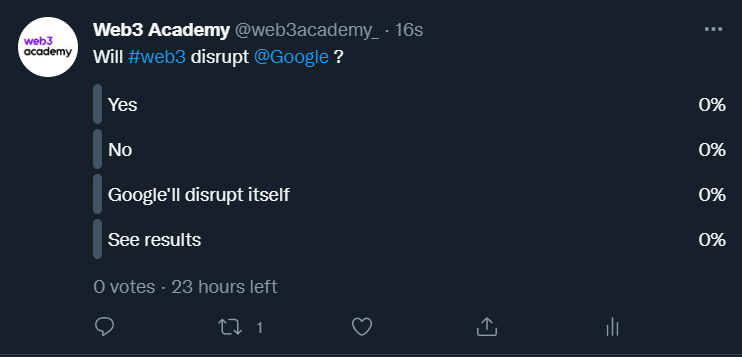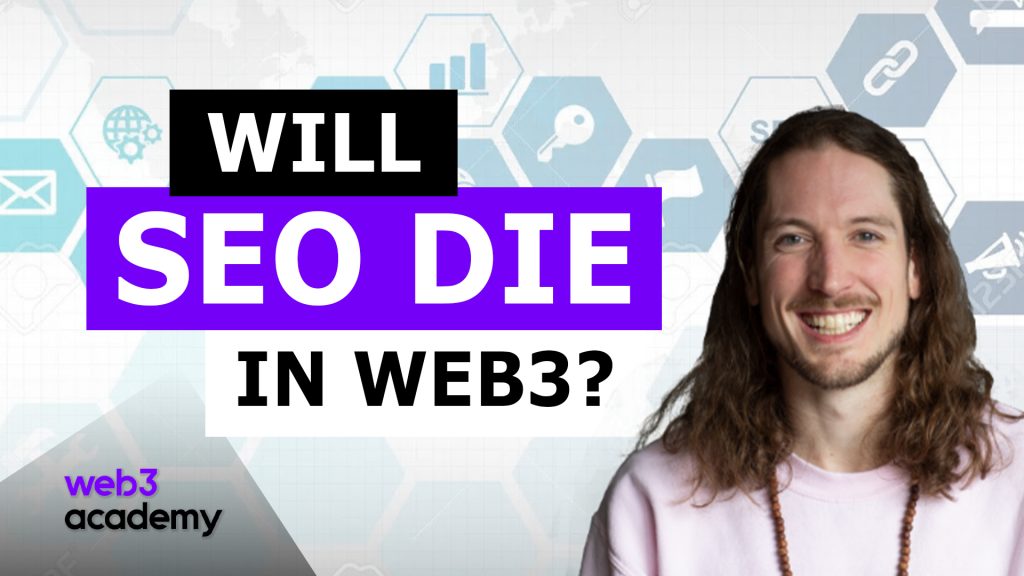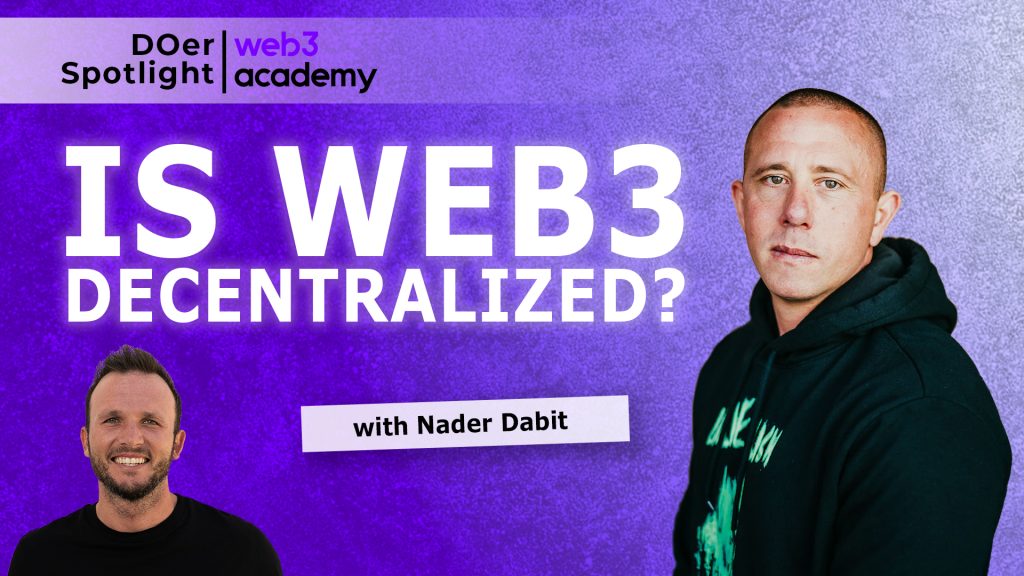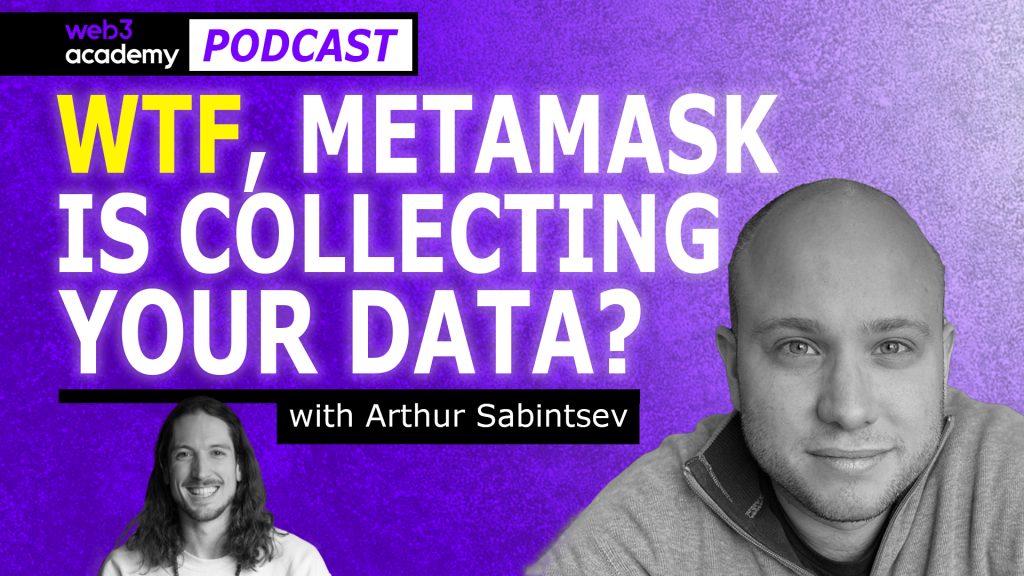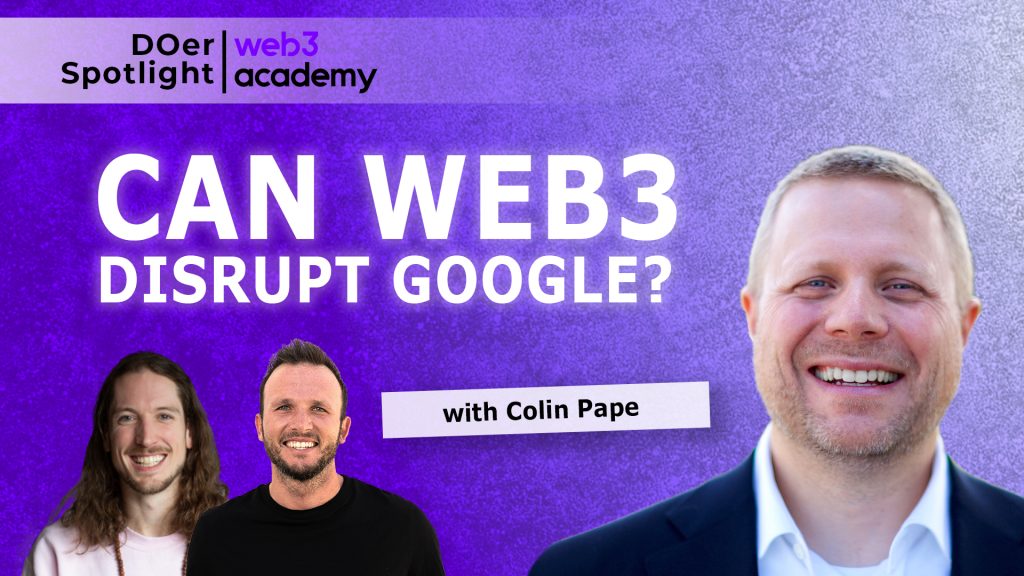
How Web3 Can Disrupt Google and Change the SEO Game | Colin Pape @ Presearch
Gm Web3 Academy DOers!
One of the most powerful tools in the world is Google. ⚒️
It’s essentially the front page of the internet for most of us.
To put things into context, out of the 4.8 Billion users on the internet, 4.3 Billion use Google 🤯 WOAH.
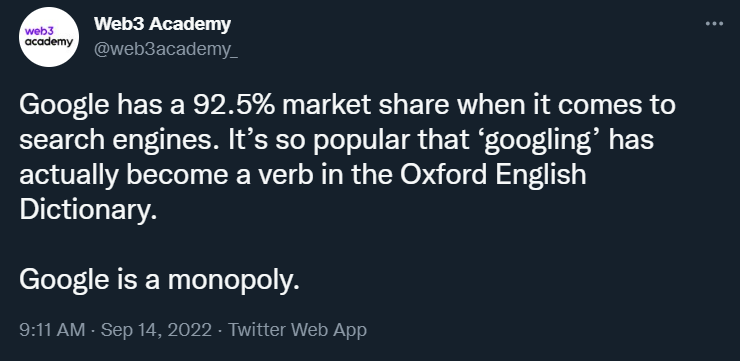
The issue here is that google has a monopoly over the internet. They control whose websites get seen, what businesses thrive or die and make billions selling our data in the process
Can web3 really disrupt this absolute behemoth?
Well, your guess is as good as ours.
But we are going to explore it anyway, because that’s what we do here at Web3 Academy.
To help us learn more about search engines and web3, we had Colin Pape on the Web3 Academy podcast. He’s the founder of Presearch, a decentralized search engine whose goal is to take on Google for the front page of the internet.
To start, let’s get into why search engines (…mainly just Google) have so much power and then we’ll explore how using web3 to align incentives may create a better search engine for everyone.
Wait 🚥 Not into reading? 📖
Sit back and watch on Youtube 👀 or listen on Spotify or Apple Podcasts 🎧
Google’s Monopoly on the Internet
Let’s be clear, Google solves a massive problem for internet users. Before Google came along, the internet was essentially unusable for the average person.
To get to a website, you used to have to type in the exact URL into your browser. Nowadays we can simply start typing any word and Google begins suggesting the sites we want before we even finish.
The way Google does this is it ‘crawls’ the internet ‘indexing’ every public website available. It looks at various aspects of the website and using an algorithm it spits out relevant sites based on the things we search (by habit I actually just wrote the word Google instead of search 😅).
It allows me to find information and websites that I need without knowing what those websites even are.
It also does its best to find the most relevant and valuable websites for me (depending on where I live, what language I speak and my search history).
Google has done an incredible job at this and it’s the reason that 4.3 Billion people use it.
But here is the issue…
Millions of businesses around the world rely on Google to be noticed. Having your business listed on the 1st page of Google is the equivalent to having a storefront in the middle of Manhattan, New York City.
You get all the traffic!
For comparison, being listed on the 2nd page of Google is the equivalent to having a storefront in (name an irrelevant city), as less than 4% of people make it past the 1st page of Google.
Being on the 1st page of Google can literally make or break a business.
Hopefully at this point you’re beginning to understand the problem.
Let’s remember that Google is a centralized company which can make changes to its algorithm, to the content it shows and how the product works whenever it wants.
In fact, Google did exactly that to Colin Pape when he started Shopcity.com. When his business started operating in Mountain View (where Google is headquartered) everything was going great and his site shopmountainview dot com was on the 1st page of Google search results.
Then Google launched a campaign called Get Your City Online and all of a sudden shopmountainview dot com is on page 8! Even when you searched for “shop mountain view”.
Google manually moved Shopcity’s websites down their search rankings! Colin had millions of dollars invested in his business, which was going to die if they couldn’t get back on the first page of Google. Not to mention the impact on all of their clients and local businesses which relied on Shopcity for attracting new customers.
Colin had no choice but to hire a lawyer and spend tens of thousands of dollars on PR. Thankfully Google eventually admitted they had assessed a “manual penalty” to Shop Your City websites. This was the first time Google admitted to this manipulation publicly.
But it didn’t change their behavior. Google continues to assess manual penalties to this day. The only thing that changed was that Google now has a process to dispute these penalties, which I’m sure we all can imagine how effective that is.
It’s scary to think about how much power Google holds, it’s even scarier to know that they actually use it!
If Google is going to remain the front page of the internet, we need it to become decentralized… If not, then we need to create its decentralized counterpart.
🎉 Tweet Of The Week 🎉
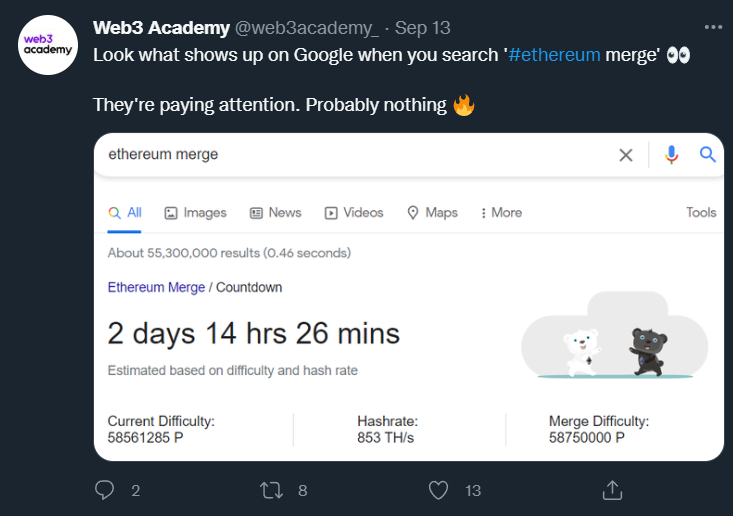
Why Would People Use a Search Engine Other Than Google?
If you’re a web3 fanatic, you might be thinking that people will simply switch to using a decentralized search engine which doesn’t collect and misuse our data.

Unfortunately, you would then also be wrong.
For example: It doesn’t matter how much Facebook violates our privacy or sells our data, we still use its products.
We use it because It makes our lives easy and allows us to communicate with friends and family. And while we might not admit it outloud, the majority of us prioritize convenience in our lives.
We sold ourselves to big tech a long time ago and web3 isn’t changing that for the masses.
So what do we do?
Well, what if we simply paid users to search on another platform. 🤔
I would bet if most people had the option to search on platform A which paid you and platform B which did not, most people would go to platform A.
Well that is exactly what web3 tools enable, the ability to pay users in the native token of the protocol. This token-based reward system has huge potential to drive traffic towards web3 native search engines, and it’s exactly what Presearch is experimenting with.
You might be asking, how can this new search engine afford to pay people for searching?
The answer to the question is the same way that Google makes billions of dollars per year… Search Ads!
But rather than the search engine charging whatever price they please and taking 100% of the profit, you create an open marketplace whereby it requires someone to purchase the native tokens and stake them in order for the ad to appear.
These ad placements for specific keywords can be in the form of an auction, which allows advertisers to stake their tokens to a keyword and rewards the ad slot to the advertiser who stakes the highest number of tokens.
This is a very simplified version of how this might work, but at least we begin to see the potential of building a tokenized search engine ecosystem.
👉 Would you start using a decentralized search engine instead of Google, if the UX was similar? Reply with Yes or No to this email right now so we can gather some data.
Increased Privacy and Security with Decentralized Search Engines
The biggest reason why decentralized search actually has a chance against Google can be defined in one word: privacy.
Many tech giants, including Google, were convicted by authorities for breaching basic user privacy laws. Recently, Google and Amazon were fined $120 million and $42 million for dropping tracking cookies without the user’s consent.
Unlike centralized search engines, decentralized search engines don’t have any central control and are instead distributed across networks. Therefore, no single company owns your data or has access to your search information.
Rather than Google or Microsoft owning your data, you own it and control access to it with a private key. This is the power of the blockchain, putting control and ownership back in our hands.
Furthermore, there is a big risk with all of our data being controlled by one company.
This means that there is the potential for one point of failure. This could enable a hacker to access all our private data through one breach. Or a terrorist could attack a central server centre and compromise significant amounts of important personal, business and governments data.
A decentralized search engine on the other hand would store data on a distributed ledger which is powered by a peer-to-peer network’s collective effort. Each node (computer) on the network acts as a potential source of searching, storing and managing the distributed ledger.
It’s also important to note the decentralized search engines would be neutral. They would not distort search results based on corporate policy, paid advertisements, or even government policy.
You might be wondering why someone would want to be part of running a node and powering this decentralized search engine.
Again, it comes down to token incentives.
Similar to how Ethereum or Bitcoin work, people would be paid in the native token for running a node and enabling the network.
The Impact of Decentralized Decision Making on Search
Unlike the centralized search platforms that are mostly driven by companies with vested interests, distributed search engines are operated with the community’s interests at heart.
Token holders can vote on and ensure funding is directed towards developing projects which benefit the community while also earning tokens for their contribution.
Rather than decision making happening at a centralized source it can be community led.
Communities inherently make decisions that benefit the community whereas centralized decision making tends to benefit the few.
I think we all believe that search engines are a public good. It’s a necessary part of ensuring fair and equal access to the vast resources and knowledge that exist online. It enables people around the world to learn new skills and drastically improve their lives and their communities.
Let’s hope web3 makes this a reality!
😂 Meme Of The Week 😂
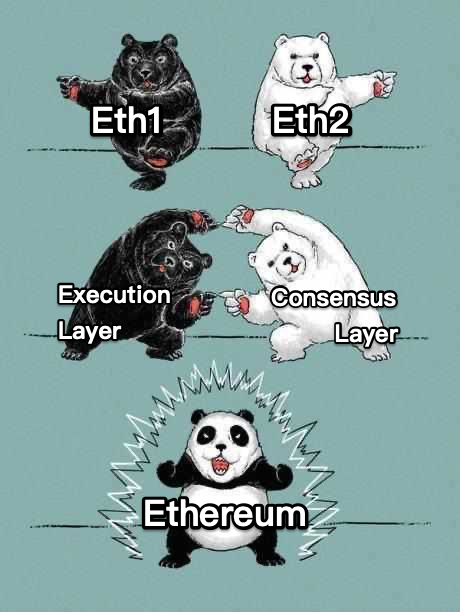
Conclusion
As with so many industries, there is massive potential for web3 to disrupt search engines. Whether this tokenomic structure will actually work is yet to be seen.
But one of the leaders in the space, Presearch, has already accumulated over 2 million members and is certainly headed in the right direction.
Will web3 ever disrupt Google? Only time will tell. But you can go to our Twitter right now and say what you think. 👇
To conclude, it seems clear that either Google needs to evolve and adapt or companies like Presearch will disrupt it by creating a more community driven search engine which aligns incentives across all users.
Thanks for reading, frens ✌️
Connect with Colin on Twitter
🚀 Action Steps For Web3 DOers 🚀
👉 By replying to this email with YES or NO, let us know if you’d prefer a decentralized search engine over Google 👀
👉 Head over to the Web3 Academy Twitter and vote on whether or not Web3 will disrupt Google!
👉 Is Big Tech Entering Web3 Good Or Bad For The Industry? Find out by reading our deep dive on this topic 🔥

